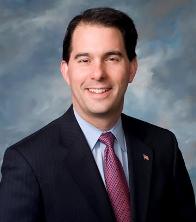Walker’s Presidential Campaign Lasted Two Fewer Weeks Than Tim Pawlenty’s
Walker’s campaign lasted just 71 days compared to 85 for the former Minnesota governor

Smart Politics posed the question on Sunday whether Walker would last as long on the campaign trail as former Wisconsin GOP Governor Tommy Thompson, who launched an unremarkable 131-day failed bid in 2007.
Walker ended up two full months shy of that mark.
Governor Walker ended his campaign just 71 days after his July 13th official announcement after seeing his polling numbers tumble from double-digits to near zero in just over two months – and after two poorly reviewed debate performances.
Walker was occasionally compared to another Midwestern governor who launched a presidential bid last cycle – Tim Pawlenty.
Both men were seen as potentially strong candidates from bluish states that the establishment could rally behind, plus Walker had the added expectation of purportedly being able to also appeal to the party’s conservative Tea Party bloc.
In the end, Walker’s campaign was two weeks shorter than Pawlenty’s – who was on the trail for 85 days from his official announcement on May 22 until August 14, 2011.
One difference between Thompson’s presidential bid and that of Walker was that the former was never expected to be a contender for the nomination in the 2008 cycle.
Governor Walker was seen by many as a GOP front runner (and had the early poll numbers to lend credence to that view) – though that early status was perhaps massaged by party elites and media narratives that framed the governor’s adherence to strong conservative policies in the Badger State as a political currency that would translate, regardless of how that message was delivered, into sustained national support.
But the truth is few Republican voters knew much about Walker or his low-key personality when he received the early status of a top-tier candidate. And when millions watched him disappear behind much stronger personalities in two high-profile debates, they ultimately were not impressed.
With Walker’s early departure several months before the first caucus or primary, he falls well short of taking the mantle from Robert La Follette, Sr. as the strongest presidential candidate in Wisconsin history.
Follow Smart Politics on Twitter.

Ironically, it was the labor unions (chapters/branches) based in the Badger State that, by pushing for an early recall vote, helped vault a heretofore nondescript local technocrat into a national paladin against alleged non-rightist tyranny.